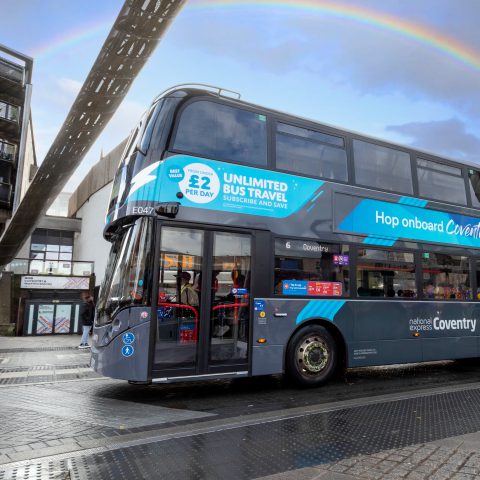First 50 e-buses are operating in Coventry on the way to the establishment of UK first all-electric bus city
A first batch of 50 e-buses (out of the 130 units order) have started service in Coventry, in the framework of UK plan for the first all-electric bus city. 300 e-buses are set to be in operation by 2025, 130 have been commissioned to Alexander Dennis in early 2022. The city already had 10 all-electric […]

A first batch of 50 e-buses (out of the 130 units order) have started service in Coventry, in the framework of UK plan for the first all-electric bus city. 300 e-buses are set to be in operation by 2025, 130 have been commissioned to Alexander Dennis in early 2022. The city already had 10 all-electric buses operated by National Express so this brings the total number of buses in the city to 60.
Transport for West Midlands (TfWM) has been working with Coventry City Council on the scheme and has secured £50 million Department for Transport funding to develop charging infrastructure and to top up the investment being made by bus operators in upgrading their fleets with electric vehicles. This will include upgrades such as charge points at bus depots across Coventry and Warwickshire.
A quarter of the council’s fleet are now all electric, and we have 607 charging points in the city – more than any other city outside of London
Jim O’Boyle, Coventry City Council’s cabinet member
50 new electric buses on the road of Coventry
The 50 new National Express Coventry double-decker buses are the first of up to 300 new vehicles due to arrive over the next three years under the pollution busting ‘Coventry’s Electric’ programme. National Express has also invested over £60m, meaning over a third of its Coventry fleet is now electric, with another 80 committed for early 2023, Coventry City Council points out in a press note.
What makes this project interesting is that a third party, the UK company Zenobē, will be providing Electric Transportation as a Service (ETaaS) to National Express, financing and managing the full turnkey solution that includes new BYD ADL vehicles, on-board battery replacement, charging and grid infrastructure, a second life battery system at the depot, unique software to optimise charging, parts, and full operational support.
Cllr Jim O’Boyle, Coventry City Council’s cabinet member for jobs, regeneration and climate change, said: “We put the bid together and convinced the government that Coventry is the right place to become an all-electric bus city. Hitting a milestone of 50 new all-electric vehicles is fantastic and the city is really gearing up to creating the right infrastructure for the increase in zero emission vehicles. A quarter of the council’s fleet are now all electric, and we have 607 charging points in the city – more than any other city outside of London. This is all part of our joint efforts to help lead on the green industrial revolution and cut our carbon footprint. There are a number of partners involved and it highlights the excellent joint working relations between the different organisations involved. We are very proud to say that Coventry will be the country’s first all-electric bus city.”
National Express, a vision to become UK’s most sustainable bus and coach company
Tom Stables, CEO National Express UK, added: “Our vision is to become the UK’s most sustainable bus and coach company and it’s been great to see this month’s COP27 putting a real focus on how businesses can play their part in addressing climate change. More people using public transport has significant benefits for society including safer roads, increased access to opportunities, reduced congestion, improved air quality and more space in our cities. We’re proud and excited to be leading the way in making Coventry all-electric and are actively recruiting new drivers to join us in the green revolution. Full training is provided and we have recently launched new pay rates of up to £29,500, or more with overtime.”
Steven Meersman, co-founder and director at Zenobe, said: “It’s a pleasure to work with innovative partners at Transport for West Midlands and National Express UK to deliver the first Energy Transition as a Service (ETaaS) contract in the electric bus sector, offering a ready to go electric bus fleet backed up by operational guarantees, so they can focus on their fantastic customer service and day to day operations.”







